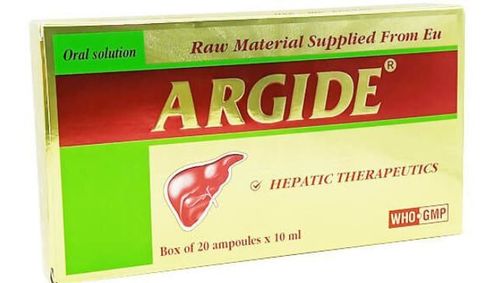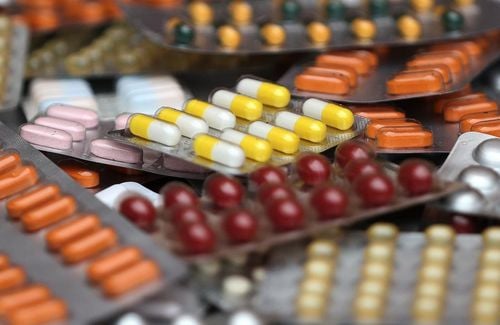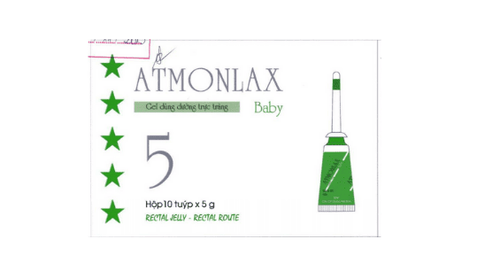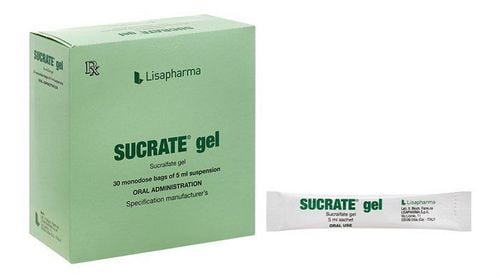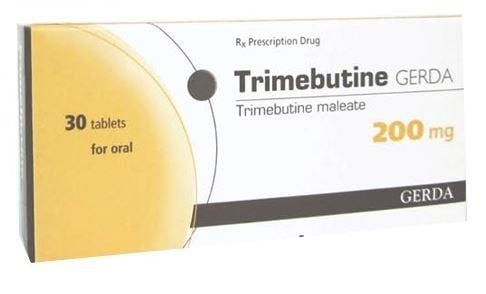This is an automatically translated article.
Bismuth is an active ingredient that supports the treatment of peptic ulcers due to many different causes. On the market, the active ingredient Bismuth Subcitrate is present in many medicinal products, including Trymo Tablets. What are the uses of Trymo Tablets?
1. What are the uses of Trymo Tablets?
Trymo Tablets with the main active ingredient is Bismuth subcitrate 120mg. The main effect of Trymo is to help relieve symptoms in patients with peptic ulcers, and Bismuth also helps speed up the healing of ulcers. The mechanism of action of Trymo Tablets is different from other active ingredients used in the treatment of peptic ulcers, including histamine H2 receptor antagonists.
The following pharmacological effects of Trymo Tablets have been observed in laboratory animals:
Under the action of stomach acid, the bismuth oxide in Bismuth subcitrate will precipitate and form a strong adhesion to the mucosal surface. gastrointestinal tract; With the ability to bind with chloride ions to form insoluble Bismuth Oxychloride, leading to indissolubility in the blood, it helps to eliminate the toxicity of the active substance Bismuth Subcitrate; Bismuth ions have the ability to inhibit the growth of Enterococcus, Staphylococcus, Pseudomonas bacteria, so they can change the gastrointestinal bacterial population; Bismuth ions stimulate increased mucus secretion, thereby blocking the activity of HCl and pepsin; Trymo Tablets for anti-ulcer activity in rats and guinea pigs with various peptic ulcers; Experimental studies have demonstrated that Trymo Tablets form complexes with gastric glycoproteins, thereby significantly slowing the movement of H+ ions. The formation of this complex at the ulcer prevents the dispersion of HCl. The recognized pharmacological effects of Trymo Tablets in humans include:
When the ambient pH is below 5, Trymo Tablets form a precipitate of bismuth oxychloride and bismuth citrate. Due to the chelating effect, protein degradation products together with the precipitate from Trymo Tablets form an insoluble layer at the ulcer site; Trymo Tablets also combine with mucus to form a glycoprotein-bismuth complex, thereby forming a barrier against HCl without affecting the ion exchange capacity of the mucus; Trymo Tablets increase the number of macrophages to help damaged mucosa heal faster; Trymo Tablets have a direct effect on killing Helicobacter pylori bacteria; Trymo has little effect on the acidity of gastric juice.
2. Indications and contraindications of Trymo Tablets
Trymo Tablets is indicated for use in patients with the following problems:
Duodenal ulcer; Acute exacerbation of chronic gastritis; Benign gastric ulcer; Indigestion without ulcer; Combine Trymo Tablets in triple therapy (in combination with Metronidazol and Tetracycline or Amoxicillin) to eradicate Helicobacter pylori. Contraindications of Trymo Tablets:
Patients with severe renal dysfunction; Patients who are pregnant, nursing and children should not take Trymo Tablets.
3. Dosage, how to use Trymo Tablets
Trymo Tablets products are taken orally on an empty stomach (about 30 minutes before meals). Patients should swallow Trymo Tablets whole without chewing or crushing them.
Recommended dosage of Trymo Tablets is as follows:
Usual dose: Take 2 Trymo Tablets each time, 2 times a day; If the patient is treated with Trymo Tablets for the first time, the duration of use is 4 weeks and maximum is 8 weeks; Do not use Trymo Tablets as maintenance therapy after up to 8 weeks of treatment have passed; If a further course of Trymo Tablets is planned, it should be at least 8 weeks apart from the previous course of treatment; If used in a 3-drug regimen, the recommended dose of Trymo Tablets is 1 tablet each time, 4 times a day for 2 weeks. Overdosage of Trymo Tablets and treatment:
Bismuth subcitrate colloidal active ingredient, when taken at the recommended dose, rarely causes serious side effects. However, there have been some reports of renal failure, encephalopathy and neurotoxicity following acute or chronic overdose of Trymo Tablets; There is currently no optimal therapy for Bismuth overdose. Treatment measures should be applied including gastric lavage, purging and correction of water and electrolyte balance even if the patient is late to the hospital; Chelating agents may be effective in the early stages of Trymo Tablets toxicity, and administration of 2,3-dimercapto-1-propan sulfonic acid 100 mg three times daily may increase Bismuth clearance in kidneys and lower blood levels of Bismuth.
4. Trymo Tablets side effects
When using Trymo Tablets, patients may experience some undesirable effects as follows:
Nausea, vomiting and diarrhea are occasionally reported; Headache and dizziness have also been reported with Trymo Tablets; Patients may have melena due to bismuth sulphide excretion in the stool.
5. Some precautions when taking Trymo Tablets
Although there are no reports of Bismuth encephalopathy after using Trymo Tablets at therapeutic doses, physicians should be aware of this risk and avoid prescribing an overdose. For the same reason, long-term use of Trymo Tablets is not recommended. Trymo Tablets does not affect the user's ability to drive and use machines.
6. Trymo Tablets Drug Interactions
The absorption of iron, calcium or Tetracycline may be reduced when these substances are used concurrently with Trymo Tablets.
Stomach or milk antacids used concurrently with Trymo Tablets may form chelators and affect the effect of colloidal Bismuth subcitrate. Therefore, avoid taking food or antacids within 30 minutes before or after taking Trymo Tablets.
Please dial HOTLINE for more information or register for an appointment HERE. Download MyVinmec app to make appointments faster and to manage your bookings easily.





